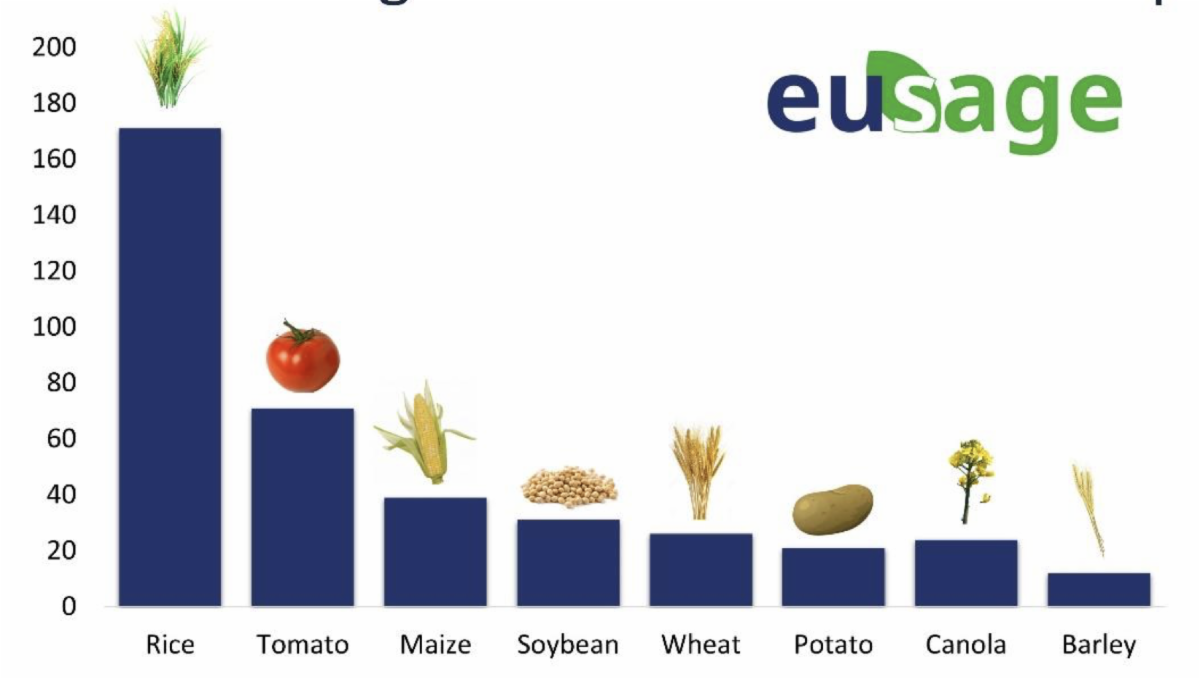News Bits
U.S. corn and soybean planting is close to normal after the slow start to the season. Still, delays due to wet weather persist in some areas, including northern portions of the Midwest and Plains.
The USDA says that as of Sunday, 86% of the corn crop is planted, compared to the five-year average of 87%, with 61% emerged, compared to 68% on average.
66% of soybeans are planted, compared to 67% normally in late May, with 39% emerged, compared to 43% on average.
29% of U.S. winter wheat is called good to excellent, 1% above a week ago, with 72% of the crop headed, compared to 76% on average.
73% of spring wheat is planted, compared to the five-year average of 92%, with just 42% emerged, compared to 69% on average.
68% of cotton is planted, compared to 64% typically this time of year, with 7% squaring, matching the normal pace, and 44% of the crop is in good to excellent, 1% more than a year ago.
95% of rice is planted, compared to the five-year average of 94%, with 79% emerged, compared to 81% on average, and 71% rated good to excellent, a week-to-week gain of 1%.
24% of U.S. pastures and rangelands are good to excellent, 2% higher.
Source: Agri Marketing magazine
14 companies with a significant presence in agriculture were included in Fortune magazine's 2021 listing of the 500 largest U.S. corporations.
Those companies include (2021 $billion revenues...% change...2020 ranking):
38. Archer Daniel Midlands: $71...+33%...51
71. Merck: $51...+7%...65
81. Tyson Foods: $47...9%...73
80. Nationwide: $47...+13%...76
84. John Deere: $44...+24%...88
90. TIAA/CREF: $40...(3%)...78
98. CHS: $38...+35%...103
232. Land O'Lakes: $16...+14%...219
237. Corteva Agriscience: $16...+10%...214
294. Tractor Supply Co.: $13...+20%...291
295. The Andersons: $13...+55%...366
305. Mosaic: $12...+42%...346
334. AGCO: $11...+22%...351
382. Seaboard: $9...+30%...406
440. Zoetis: $8...+17%...431
The five largest U.S. based companies were (2021 revenues in U.S. $ billions...% change from 2020):
1. Walmart: $573...+2%
2. Amazon: $470...+22%
3. Apple: 366...+33%
4. CVS Health: $292...+9%
5. UnitedHealthGroup: 288...+12%
Kansas Gov. Laura Kelly signed into law yesterday House Substitute for SB 261, also known as the fake meat labeling bill. The KLA-supported bill already had been passed by both the House and Senate.
As of July 1, the new law will require producers of alternative meat products that use meat terms to include a disclaimer indicating the product does not contain meat on the label in a prominent and conspicuous font size in close proximity to the meat term.
Disclaimers can include vegetarian, vegan, meatless, meat-free, plant-based or other terms approved by the Kansas secretary of agriculture as appropriate. Without such disclaimers, the product will be considered misbranded.
While overall U.S. dairy consumption remained flat from 1979 to 2019, daily cheese consumption more than doubled, according to loss-adjusted food availability data from the USDA, Economic Research Service (ERS), which adjusts the amount of basic commodities available in the food supply for food spoilage, plate waste, and other losses to more closely approximate actual consumption.
Overall U.S. dairy consumption remained roughly the same over this 40-year period, at just under 1.5 cup-equivalents of dairy products per person per day. However, daily cheese consumption grew to 0.72 cup-equivalents per person in 2019 from 0.34 cup-equivalents per person in 1979. Yogurt consumption grew almost fivefold to 0.05 cup-equivalents per person.
Fluid milk consumption stood at 0.5 cup-equivalents per person in 2019, down from 0.9 cup-equivalents per person in 1979. Several factors contributed to this decline, including competition from alternative beverages, an aging population with differing preferences across generations, and changing consumer attitudes regarding milk fats.
 Genome editing is used in 63 different crops
Genome editing is used in 63 different crops Genome editing is used in 63 different crops
Genome editing is used in 63 different crops